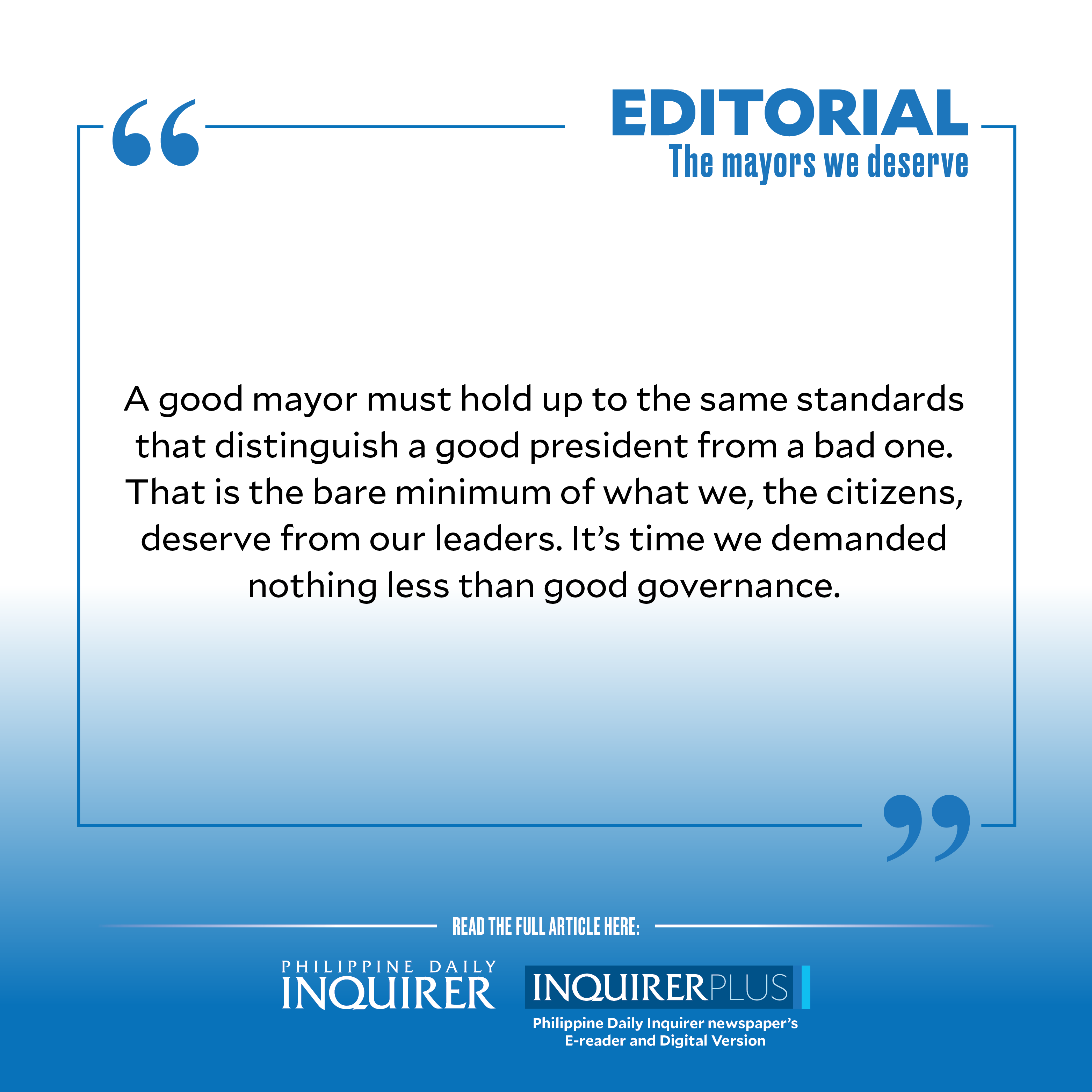The mayors we deserve

What makes a good mayor?
Is it enough to be an excellent decision-maker? Or a skilled administrator? Does it require political savvy to negotiate the complex terrains of local government office, or the courage to challenge its unspoken rules? How necessary is an aptitude for saving money and managing resources, and to be clean and incorruptible at the same time? Is it important to speak eloquently, to stir change, to unite communities, or to preserve the peace? What about the subtle art of inspiring others by deed and example?
Some might object: Surely it’s too much to expect any mayor to satisfy these conditions. Local chief executives are not superheroes, their limited powers restrained by red tape and a myriad of conflicting interests and constituencies.
But that poor excuse is why many leaders of our towns and cities are either crooked or incompetent, or both, because the bar for governance has sunk so low that a “good mayor” is now a rarity rather than the norm. Such is the consequence—and tragedy—of our lowered expectations.
Which is why it comes as no surprise that of the country’s 1,600 mayors, less than a tenth—only 146 as of last week—have signed the manifesto of the “Mayors for Good Governance,” a new movement for responsible leadership that seeks to stamp out corruption in local government.
Signatories of the manifesto “vow to maintain the highest standards of integrity and transparency in all aspects of governance. Our actions and decisions will be driven by honesty and accountability, ensuring that the public’s trust in our office remains our foundation for our service.”
One of the prime movers, Baguio City Mayor Benjamin Magalong, wondered why there were so few of them. Answering his own question, he cited lack of awareness and “big pressure.” “And third, is because they are not willing to give up the perks and privileges of power. Why? It can be summarized with the acronym MAP—Masarap Ang Pera,” Magalong said.
Still, we applaud the mayors behind this movement for their timely and exemplary initiative. They deserve praise not only for taking a stand against corruption but for risking their political future by walking this less-traveled road. The public must rally behind them.
“It will be tough,” Magalong admitted. And he is right.
Corruption is entrenched in our government from its lowest rungs to its highest echelons. It penetrates every aspect of our dealings with public office, when coast guard officers ask for “pampangiti” bribes to allow an overloaded boat to sail in stormy waters or when bureaucrats hire a cash-strapped company to supply our medical needs at the peak of a pandemic.
That mayors are at the forefront of this anti-corruption effort is significant because they, next only to barangay chairs, are Filipinos’ closest line to the government. When a mayor is good, the people know it. They talk about what the mayor is doing for the locality. Conversely, when the mayor is corrupt, the people know it too. They talk about it in whispers.
Yet come election time, voters will keep bad mayors in office for the same reasons that the abused will seek the solace of their abusers. Their votes, and loyalty, are sold to political clans who owe their riches and influence to the taxpaying electorate.
Every now and then, a good mayor rises from the detritus of patronage politics. We remember the late, lamented Jesse Robredo, who rose to prominence for introducing meritocratic governance as mayor of Naga City. In 2000, he received the Ramon Magsaysay Award for “giving credence to the promise of democracy by demonstrating that effective city management is compatible with yielding power to the people.”
But for every Robredo, there are scores of criminal mayors who revel in power and impunity, like Antonio Sanchez of Calauan, Laguna, who masterminded the murder of two University of the Philippines students in 1993, or Andal Ampatuan Jr. of Datu Unsay, who orchestrated, along with his father and kin, the 2009 massacre in Maguindanao.
Some mayors have ascended to the highest post in the land. Joseph Estrada was mayor of San Juan before he rose to senator, vice president, and president, until he was deposed in 2001, convicted of plunder in 2007, only to become mayor again, of Manila, from 2013 to 2019. Rodrigo Duterte wielded identical instruments of fear and bloodshed as mayor of Davao and as president of the Philippines. Now his daughter, a former mayor herself, is a heartbeat away from Malacañang.
Which brings us back to our question: What makes a good mayor? Must one be a capable manager, a problem solver, a peacekeeper, a salesperson, a cheerleader, a consensus builder, a graft-buster, or a reformer?
The answer is all of them at once—because a good mayor must hold up to the same standards that distinguish a good president from a bad one. That is the bare minimum of what we, the citizens, deserve from our leaders. It’s time we demanded nothing less than good governance.
















